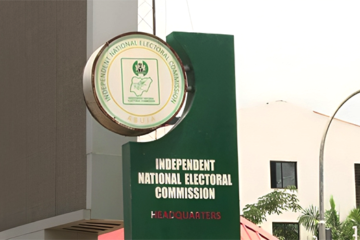Insincere government, rogue ideas [OPINION]

Abimbola Adelakun
By Abimbola Adelakun
If there is an issue everyone—and I mean everyone—agrees on, it is that the cost of running the government needs urgent and radical pruning. One of the most topical issues in the public service system, administrative cost, is also where the government’s indecisiveness is highly exemplified. So it was no surprise when, on Monday, President of the Nigeria Labour Congress, Joe Ajaero, reported President Bola Tinubu’s justification for having an even more expanded cabinet. Ajaero, during their meeting with the president on the pressing issues of the fallouts of his policies, had tasked him with reducing the number of tentative ministers. Tinubu responded that, as labour union leaders, they ought to view his bloated cabinet from the perspective of job creation. The other borderline revelation from Ajaero was that Tinubu claims that to save money, he lives in a two-bedroom apartment, and had offered to use his private jet (instead of the official one) and reduce the number of vehicles in his motorcade. The last two proposals, he claimed, were denied because of security concerns.
If Tinubu believes appointing 48 ministers with the ripple effect of more appointments of a retinue—all shades of aides and special assistants who will also hire their own aides with added perks such as furniture, wardrobe, housing, car allowances and estacodes—will have a significant impact on the unemployment crisis, we should all flinch on his behalf. Was it not just last week that his Director-General, Budget Office of the Federation, Ben Akabueze, lamented the Federal Government’s personnel cost of N5tn before a legislative committee? Did he also forget that he promised a structural review of the civil service payroll just a few days ago? Within a few days, he had gone from wishing to purge to becoming flatulent. The inconsistency generating these rogue ideas suggests insincerity. They are already confused by the complexities of the country and cannot figure out which direction to go.
Nigeria’s unemployment situation cannot be impacted by turning bureaucracy into an industry. More than half of the country’s population is either unemployed or un-gainfully employed, how many can the government possibly absorb? Besides, the government does not create jobs by merely taking party loyalists and some of their hangers-on off the streets. The creation of jobs is a consequence of policies that facilitate a conducive environment for private businesses to thrive. Nigeria is not yet at that place; we rank dismally on the global ranking of ease of doing business. Our public administrators, unable to build a system that allows enterprises to breathe, have found a shortcut to generating employment in padding public service. Time and space will not permit a rundown of the worst culprits.
Resolving the problem of an expensive civil service will need far much more than petty gimmicks; it will take an entire administrative attitude. The subject is an old conversation that keeps acquiring currency. In 2011, former President Goodluck Jonathan set up a committee headed by Steve Oronsaye for this same purpose. They delivered an 800-page report detailing wide-ranging reforms. From that point, different administrations have set up implementation committees, reviews of reports, reviews of reviews, White Paper, and so on. Nothing much changed. Between 2016 and now, the cost of running the government in fact increased by about 400 per cent. That was a lot of time and effort spent retrogressing. No wonder we are down to superficial solutions such as the empty symbolism of jettisoning the presidential jet. For a man like Tinubu who has never demonstrated the integrity of separating what belongs to the public from what he owns, it will amount to an error to let him do official business from his private jet. As for his motorcade, cutting down on the unwieldy number of vehicles is far better for him, security wise, than the unwieldy horde he lungs around the FCT.
If he truly wants to make personal sacrifices to contribute his share to reducing the cost of governance, a more meaningful move would be to mobilise his Lagos party members to entirely repeal the odious pension law. That would be a good place to start. It was Tinubu’s last-minute parting gift to himself but has since become a model for other governors who want to eat the future of even unborn children. That he applauded present Lagos governor Babajide Sanwo-olu’s move to amend the law and slash the benefits does not change the question of why he ever felt the need to take so much for himself. Why sign it into law if not for a lack of conscience? Nigerian leaders hardly know more than smash, grab, and run. While in the office, they take and take and take. When it is time for them to leave that office, they are so frightened by the reality of a life no longer propped up with the sweat and blood of poor people. Their next move is to create pipelines to funnel money from the public purse into their private pockets. It is a madness that keeps exceeding diagnoses.
The pension law that targeted Tinubu as the prime beneficiary is only one of the many acts of authority stealing institutional robbery that needs to be dismantled. Instead of moaning that security concerns keep him from making significant reforms to reduce what he costs the nation as president, how about starting from where your hands are not tied? Like Zacchaeus the tax collector who resolved to refund what he immorally took four times, Tinubu should return every pension he ever took from Lagos with interest. Let the state invest the money in education so some Lagos children can start breathing.
Since his harsh reforms started to suffocate life out of poor people, we have been serially entertained with hired propagandists, talking heads, and faux analysts who run from one soapbox—either on television or social media—to another to enjoin Nigerians to keep enduring suffering for some vague promise of greater glory. Those sermons have become tiring; they assume people they are talking to have enough left to keep sacrificing. If the country will truly advance that way, why should the people already impoverished by the greed of the Nigerian political class keep making all the sacrifices while the privileged get to keep their loot? The pain should be generously circulated across the board. If they are sincere that the sacrifices are worthwhile and there is a promise of abundance at the end, they too should offload some of their own benefits.
The All Progressives Congress cannot, of course, do much about their Peoples Democratic Party counterparts especially at the state levels where all kinds of injustices have been entrenched, but they can work on themselves. It will take some sincerity of purpose, but by making belt-tightening measures for the ruling class they can demonstrate their faith in the abundance that awaits everyone if we can endure some more suffering for some more time. They should pressure themselves to repeal the pension laws that have turned greedy governors (and their deputies) into a raging army of locusts. They should drastically cut down on their perks, fix the number of aides they can appoint to a bare minimum, freeze estacodes, and get rid of outdated privileges like “official cars.” These are lean times; public officers should use their personal cars. When they go on official errands, they can be refunded the cost of petrol and a set amount for wear and tear on their vehicle calculated according to the mileage expended. It is all possible except, of course, but the truth is out of character for them. Their new leader is Abdullahi Ganduje who also does not separate his agbada pockets from the public purse. When he tells you to sacrifice, what he is asking is for your sweat to keep sponsoring their excesses.
Culled from The Punch











